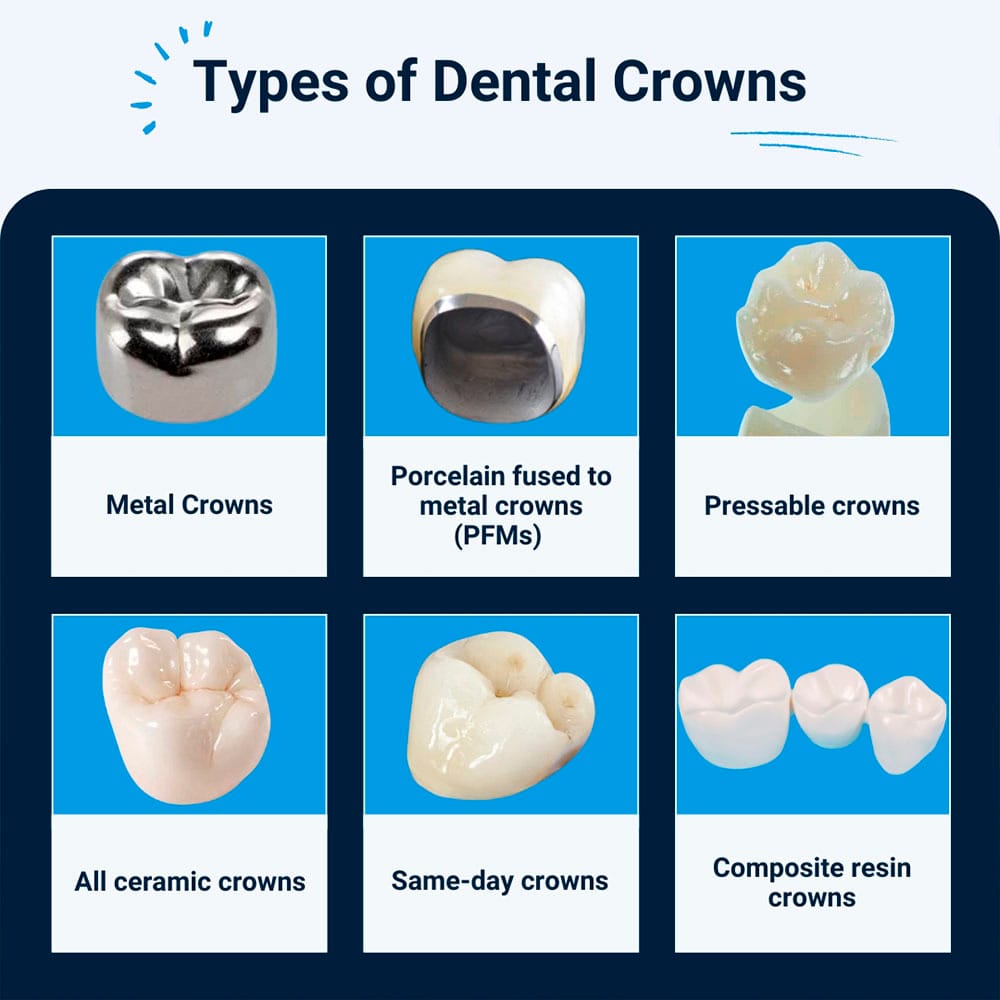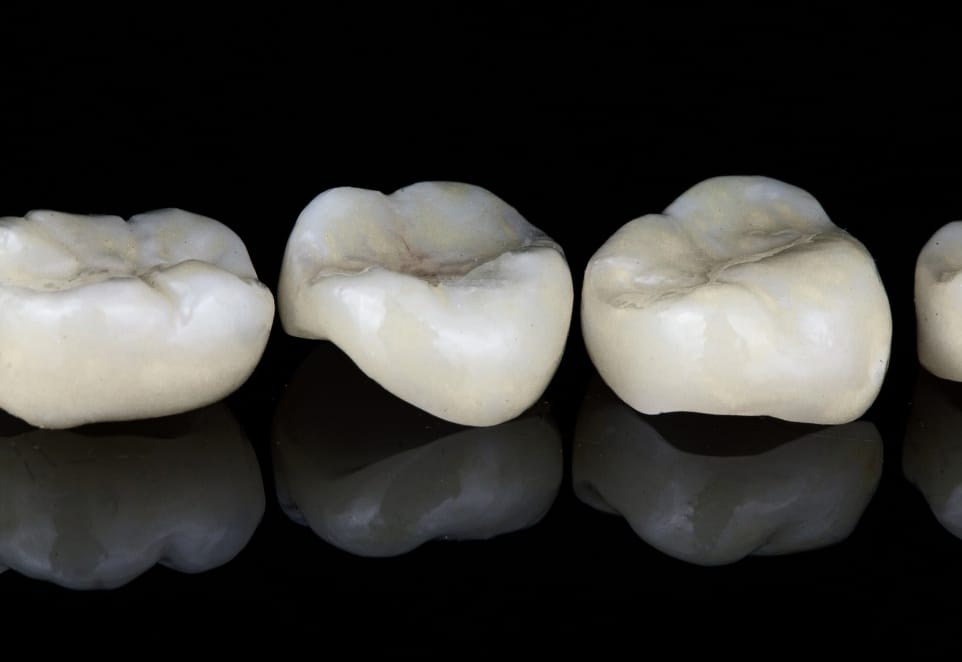What Is a Dental Crown?
 A dental crown is shaped like a real tooth and covers a natural tooth completely. It restores strength, structure, and appearance and is precision-made so the tooth underneath is completely sealed and protected.
A dental crown is shaped like a real tooth and covers a natural tooth completely. It restores strength, structure, and appearance and is precision-made so the tooth underneath is completely sealed and protected.
Once fitted, a crown prevents any further infection and decay. This dental restoration can ensure a tooth lasts for years, hopefully for life.
Usually, it is necessary to shape a tooth in preparation for a crown, removing some tooth structure to ensure the crown fits properly and looks and feels natural.
Clock Tower Dental can provide and fit beautiful crowns made from various materials that are long-lasting and durable.
When Would I Need a Dental Crown?
We may suggest protecting a tooth with a crown in several situations. These include:
- Restore a severely decayed tooth.
- Protect a cracked or chipped tooth.
- Restore a broken or worn tooth.
- Hide a misshapen or severely discolored tooth.
- Restore a tooth after root canal therapy.
- To complete a dental implant treatment.
- To support a dental bridge.
What Are the Different Types of Crowns?
We can provide various types of crowns. The crown recommended will depend on the tooth requiring restoration, your oral health, and your personal preference.
Options can include:
- Metal crowns.
- Porcelain fused to metal crowns (PFMs).
- Pressable crowns.
- All ceramic crowns.
- Same-day crowns.
- Composite resin crowns.

Metal Crowns
A metal crown is made from an alloy, combining several different metals to create a durable dental crown. The metal is polished to a high sheen and may be silver or gold colored, depending on the alloy.
Metal is durable, and only minimal tooth preparation is needed for this type of restoration. Gold crowns are especially kind to tooth enamel, so they can be a good choice when restoring a back tooth with limited space. However, metal crowns are very visible in the mouth.
A metal crown can also be pre-made in stainless steel. These crowns are generally used to restore children’s primary or milk teeth. The pre-made crown can be adapted to fit around the tooth and remains in place until it falls out when the adult tooth is ready to erupt.
Stainless steel crowns are a cost-effective way to preserve these teeth, providing a minimally invasive treatment for children.
Porcelain Fused to Metal Crowns
A porcelain fused to metal crown (PFM) is durable and reasonably aesthetically pleasing. It has a thin metal shell covered with porcelain closely matched to the color of your natural teeth.
A PFM is long-lasting, and these types of crowns have been widely used for decades. However, the porcelain may chip over time, especially if you have a heavy bite. There is also a risk of the crown margin becoming exposed if your gums recede. The porcelain around the margin tends to be thinner, allowing the metal to shine through and potentially causing a gray line.
Pressable crowns
Pressable crowns are made by heating a ceramic material and pressing it into shape under vacuum. Special porcelain can then be added onto the pressable crown to help characterize and finish it.
A pressable crown is perfect when restoring front teeth and where aesthetics are extremely important. One well-known brand is e.max.
All Ceramic Crowns
All ceramic crowns contain no metal and offer excellent aesthetics. They are fabricated from a material called zirconia. The zirconia is milled and then sintered, where it is heated to a high temperature, a process that helps give it strength. The finished crown can then be polished or has special porcelain added to it to create the perfect shape and finish.
Zirconia crowns are also very aesthetically pleasing, but because they are stronger, they are more suitable when restoring back teeth, especially if you have a heavy bite or tend to clench and grind (bruxism).
Same-Day Crowns
As the name suggests, a same-day crown can be made and fitted during a single appointment. It is created while you wait. Same-day crowns are possible due to advanced CADCAM technology. After scanning your teeth digitally, our dentist can use the digital impression to design a custom crown.
The design is transmitted to a milling machine, where your crown is milled from a block of pre-shaded porcelain before it is hand-finished and ready to fit. These crowns are precision-made, so they fit beautifully and provide excellent aesthetics.
While same-day crowns are often a great choice, they are not right for every situation. It is sometimes preferable to have your crown created in the dental lab, even though it can take up to 2 weeks to complete. We may recommend this option if you need multiple crowns or other restorations that must be handcrafted so they blend beautifully together and match exactly.
Composite Resin Crowns
Composite resin crowns are generally fitted as a temporary measure. They are more fragile and are not designed to last long. They can easily become broken if you bite down on anything very hard or sticky, and they are likely only attached using temporary cement.
After preparing your tooth for a permanent crown, we would generally make and fit this type of crown. It would then remain in your mouth until your permanent crown was ready.
What Is the Procedure for a Dental Crown?
After examining your tooth and determining if a crown is a suitable option, you will normally require two appointments so we can prepare the tooth and fit the crown.
First Visit
- Preparing Your Tooth
Your tooth is prepared using a local anesthetic to numb it. We must carefully remove all damaged or decayed portions of the tooth, creating enough room so the crown can fit comfortably and securely without looking and feeling too big and bulky.
- Digital Dental Impression
Once your tooth is prepared, we take a digital dental impression. Digital dental impressions are extremely comfortable, fast, and non-invasive. They are taken using a small handheld scanner and will create a precise 3-D digital model of your mouth.
The scan is sent to our dental lab, along with our prescription, which includes the type of crown required and the shade where applicable. We may also include digital photographs for our dental technicians to use when handcrafting your crown. These can help provide a better idea of the color and any characterizations required.
- Placing a Temporary Crown
The final step is to protect your tooth with a temporary crown. It will be fitted onto your tooth with temporary cement, and you will need to take care not to dislodge or break it. If your temporary crown does become broken or falls out, please contact us immediately so we can arrange to replace it.
Second Visit
Once your new crown is ready, you return to Clock Tower Dental to have it fitted in your mouth.
- During the second visit, we remove your temporary crown and try in your new permanent restoration.
- Our dentist will carefully check the crown’s fit, shape, and shade.
- You can approve the crown before we permanently bond it onto the tooth with special dental cement.
Because no tooth preparation is needed, you would not normally require dental anesthetic during your second appointment.
Caring for Your New Crown
Looking after your crown is very straightforward. You can brush and floss it like an ordinary tooth. Below are some helpful tips to follow that will ensure your crown stays looking good for longer.
- Brush your teeth a minimum of twice daily. Use fluoride toothpaste and a soft-bristled toothbrush.
- Floss daily, and if you are unsure how to floss properly, please ask us for help.
- If you like to use mouthwash, choose a brand that contains fluoride or is antimicrobial.
- Avoid oral habits that could damage your teeth, such as using them to open packets or biting your nails.
- Schedule regular dental checkups and professional cleanings. These visits allow us to check the condition of your crown regularly. Cleaning around it professionally will help prolong its natural life.
- Wear a custom-fitted mouthguard when playing sports with a risk of dental injury.
- Wear a night guard to protect your crown and natural teeth if you have bruxism.
How Long Should My New Crown Last?
A good average is 10 years, but a crown often lasts longer with the right after-care. Our dentist will check the condition of your crown regularly and can discuss when it’s time to replace it. Replacing a failing crown is important so it can continue to protect the tooth underneath.
Can I Claim the Cost of a Crown on Dental Insurance?
It depends on the reason for the crown. If you need a crown to protect a tooth or to restore it after root canal therapy, at least part of the cost should be covered. If you require a crown to cover teeth stained or misshapen teeth, the cost may not be covered under your dental insurance and could be considered cosmetic.
We can advise you if the cost of your crown is likely to be covered and, if so, the percentage during your visit to Clock Tower Dental.

